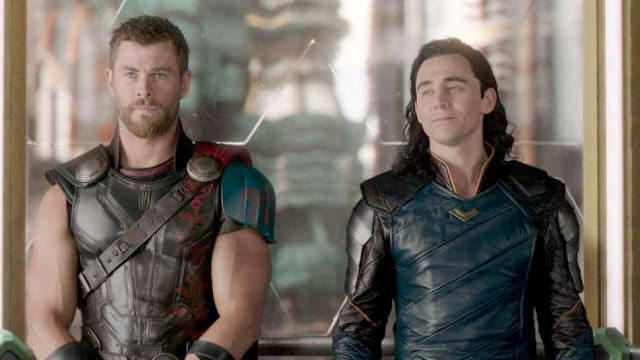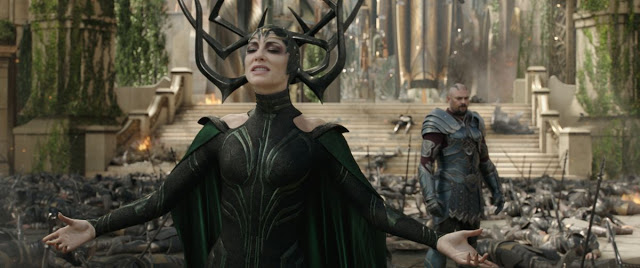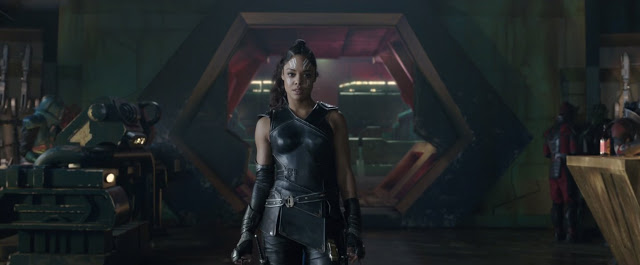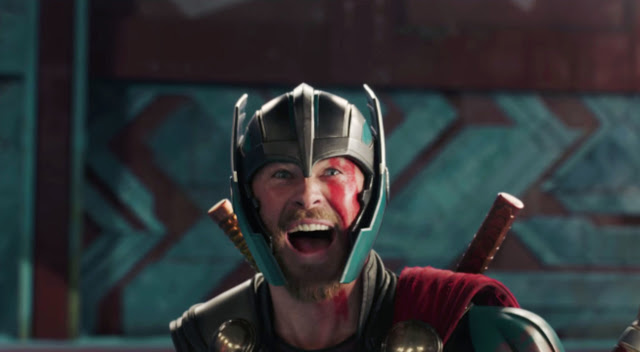Midway through Thor: Ragnarok, a creature called Korg—a soft-spoken gladiator whose body is composed entirely of lumpy blue rocks—informs the God of Thunder that the planet they’re currently inhabiting doesn’t really make sense. It may not be coincidental that Korg is voiced by Taika Waititi, the film’s director and impish guiding spirit. A New Zealand native best known for his fanciful comedies (What We Do in the Shadows, Hunt for the Wilderpeople), Waititi may not seem an intuitive choice to helm Ragnarok, the third Thor-centric feature and the seventeenth(!) installment in the corporatized mushroom cloud that is the Marvel Cinematic Universe. Yet Waititi’s gift of whimsy proves perfectly suited for the MCU, thanks to a deceptively similar set of priorities. The Marvel movies, for all their lumbering technological clamor, have typically been better at dialogue and character than at action and story, and Waititi embraces that hierarchy with energy and savvy. He realizes that, if you’re going to make a senseless comic-book movie, you might as well make it fun.
And make no mistake: This movie is senseless. Perhaps comic-book aficionados can assemble its random artifacts and fantastical esoterica—fire demons and bi-frosts, eternal flames and infinity stones, cryptic prophecies and resurrected skeletons—into an intelligible map, but even an intimate understanding of Marvel mythology cannot provide Ragnarok with any narrative logic. Nor can it instill any legitimate stakes or tension into a product that is, in broad strokes, entirely predictable. (Given Marvel’s commitment to the perpetual expansion of its sequel-happy universe, it is hardly a spoiler to declare that no Avengers were harmed in the making of this film.) But unlike the first two Thor pictures—which felt leaden and lifeless, weighed down by their ostensible otherworldliness—Ragnarok seizes on its own silliness. When it comes to enjoying this frolicsome, jokey adventure, the plot’s lack of relevance proves irrelevant.
Thor is again portrayed, as if you had any doubts, by Chris Hemsworth, that Australian Adonis with rock-hard abs and a lopsided grin. He’s as relaxed as ever in Ragnarok, which glides along with a pleasant buddy-comedy vibe, pairing its casually charming lead with an assortment of motley rogues, all played by excellent actors. (One of the benefits of the Marvel machine is that it attracts high-caliber performers who are interested in reaching a broader audience or are maybe just curious how a green-screen works.) You know Loki, of course, the thunder god’s trickster brother, whom Tom Hiddleston imbues with a slippery volatility that complements Hemsworth’s rippling physicality. And other familiar British faces appear for their glorified cameos: Benedict Cumberbatch and his still-shaky American accent pop up early as Doctor Strange, delivering some droll exposition (half of which already played as the stinger to his own origin story); Anthony Hopkins muses agreeably as Odin, the quarreling brothers’ one-eyed father; and Idris Elba returns as Heimdall, an ostensibly omnipotent seer who gets to lead a resistance and swing a big sword. They’re all amused and amusing.
Hemsworth and Hiddleston’s pleasurably antagonistic patter remains the Thor franchise’s most reliable asset—a scene where they dust off their childhood combat strategy of “Get help!” perfectly encapsulates their asymmetrical symbiosis—but it’s the new faces, along with Waititi’s lightness of touch, that elevate Ragnarok. Jeff Goldblum plays some sort of aristocratic ruler called the Grandmaster, and his carefree, heavily improvised performance amplifies the film’s jovial tone. Less capricious but far more intimidating is Cate Blanchett, who plays the raven-haired Hela, the Goddess of Death who just happens to be Thor and Loki’s sister. Wearing an antlered crown that she probably just skinned from a live reindeer, Hela’s icy regality is hard to top—Blanchett is usually hard to top—but the most appealing newcomer is actually Tessa Thompson’s Valkyrie, a hard-charging, harder-drinking warrior who establishes her toughness by kidnapping Thor before eventually becoming his begrudging ally. (Every alliance in this movie is a begrudging one.) With an Olympian broad jump and a wisecracking swagger, Valkyrie proves Thor’s equal both heroically and charismatically, and Thompson makes a smashing addition to the Avengers.
Much like an interplanetary Jason Bourne movie, Ragnarok bounces from one dimension to the next, never outstaying its welcome, at least not until the final act set on Asgard, Thor’s tedious homeland. Unfortunately, that’s where Hela spends most of her time, which proves a waste of Blanchett’s formidable talents. Hela is frightening enough, but her evil powers—she’s one of those sorceresses who seems to be able to kill people with her mind—are too abstract to land with much impact, and her quest to subjugate Asgard to her rule is rote Supervillainy 101. (It also strikes some discordant political notes, as do a refugee-themed subplot and a misjudged sequence in which a crazed soldier opens fire with actual assault rifles.)
Thankfully, Ragnarok’s longest stretch unfolds on Sakaar, a junkyard planet whose teeming, bazaar-dotted landscape is the defiant opposite of Asgard’s sterile prettiness. It is there that Thor pals around with his various frenemies, including a fellow Avenger whose identity I refuse to reveal (if only the trailers had displayed the same restraint). It would be easy for Waititi’s quippy dialogue to grow tiresome, but he keeps the zingers fresh and the banter smart. He also threads the needle between standalone adventure and franchise world-building, peppering the film with throwaway nuggets to the broader MCU—the movie’s biggest laugh is actually a callback to Loki’s epic humiliation in the first Avengers—without encumbering the narrative with excessive allusions and constant fan service.
More impressively—and, given his pedigree, more surprisingly—Waititi exhibits a sure hand with the movie’s set pieces, which are by and large breezy, spunky, and vivacious. He mostly keeps the scale small, favoring one-on-one brawls over unwieldy melees, and that narrower scope brings with it enhanced coherence. The special effects are still too weightless for the action to seem tangible, but at least everything is presented lucidly. (He also wisely ditches Thor’s famous hammer—the equivalent of a superhero cheat code—early on.) Yet even when he goes big, Waititi maintains the film’s cheery and playful essence; a spaceship race through the brightly colored Sakaar skies, highlighted by Valkyrie’s feats of acrobatic derring-do, is giddily ridiculous. Only during the obligatory climax does the action feel recycled, with Waititi dutifully obeying the Marvel mandate and concluding the picture with a sprawling, FX-powered extravaganza that is loud, hectic, and pointless.
Yet even then, the director is able to sneak some personality into the proceedings, dropping a visual reference to a French Revolution painting and soundtracking the heroes’ charge to a Led Zeppelin classic. (Speaking of music, Mark Mothersbaugh’s electronica-tinged score is the rare MCU composition that carries even a whiff of originality.) Any filmmaker with a budget can deliver a needle-drop—hell, Watchmen was loaded with them—but this is just further evidence that Waititi is genuinely committed to enlivening the MCU formula with eccentric flair and mischievous humor. At one point, Hela glowers witheringly at Thor and sneers, “To be honest, I expected more.” She’s underestimating him, but I can’t really judge. After all, I underestimated Ragnarok, a funny, colorful, and energetic movie from which I expected much, much less.
Jeremy Beck is the editor-in-chief of MovieManifesto. He watches more movies and television than he probably should.




